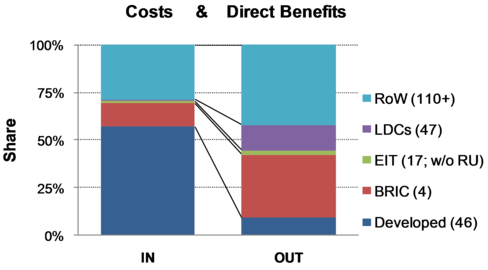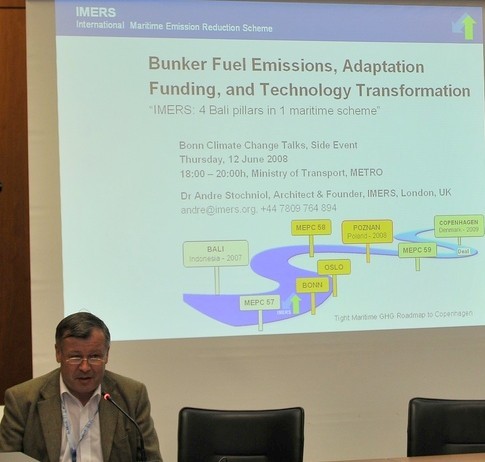- Home
- Case for Action
- IMFUND
- Solution - 3rd generation
- Buy-in
- AGF
- Achievements
- Awards
- Negotiations
- Bali 2007
- Bangkok 2009
- Barcelona 2009
- Bonn 2008
- Bonn 2009
- Bonn 2011
- Bonn 2013
- Brussels 2008
- Cancun 2010
- Copenhagen 2009
- Doha 2012
- Durban 2011
- Geneva 2009
- Lima 2014
- London 2008
- London 2009
- London 2010; 1
- London 2010; 2
- London 2011
- London 2012; 1
- London 2012; 2
- London 2013
- Montreal 2013
- Panama 2011
- Paris Goals 2016
- Poznan 2008
- In limbo ...
- Presentations
- Historical
- Search
- About
@ Bonn 2008
Bonn Climate Change Talks - 2008
Side event on Bunker Fuel Emissions, Adaptation Funding & Technology Transformation at the Bonn Climate Change Talks, 2-13 June 2008: Presentation is now available
The need to incorporate the principle of common but differentiated responsibilities in an instrument addressing shipping emissions is being actively discussed internationally.
We held a side event during the 28th sessions of the UNFCCC Subsidiary Bodies focusing on costs and benefits of an equitable hybrid scheme.
Who would benefit most?
We announced and debated results of an in-depth analysis that's started with high-level principles and their impact on various countries and stakeholders.

We clearly demonstrated how the hybrid mechanism can deliver on the UNFCCC principles, especially on the principle of common but differentiated responsibilities and respective capabilities. This focus had been requested by several parties.
The detail of the side event are:
Bunker fuel emissions, adaptation funding and technology transformation
on Thursday 12 June 2008, 18:00-20:00 hours
at the Ministry of Transport, Bonn, Room METRO
- Event flyer
- IMERS: a fair, hybrid scheme to mitigate emissions from international maritime transport that simultaneously provides innovative financing for adaptation and technology. Principles, costs & benefits, implementation & regulatory aspects, as well as impacts on states & stakeholders will be discussed.
- Increase momentum for an equitable and affordable approach.
- The event has been officially reported by the Earth Negotiations Bulletin. It generated a significant interest and stimulated lively debates, as reported:
- shortest web version (selected event; with additional links)
- pdf version
 (1.9 MB; IMERS - pg. 2-3)
(1.9 MB; IMERS - pg. 2-3)
- web version of all events (with additional pictures)
Why it was important?
- First international proposition that delivers on the 4 building blocks of the Bali Roadmap
- It does so at a scale of $4bn for mitigation, $4bn for adaptation, $2bn for technology
- Already discussed within the IMO and the UNFCCC
- The goal was to shape and increase momentum for a fair solution before 2012
Presentations and 3 debates were focused on
- How to differentiate responsibilities within a global scheme for shipping?
- Key design principles for an equitable and cost-efficient scheme:
- Mitigation & adaptation equally important (funding 50:50)
- Adaptation funding for developing countries only, of which 30% for LDCs (Least Developed Countries)
- Technology fund to accelerate innovation and technology transfer
- Long-term emission reduction goal
- Supra-national implementation
- Mitigation & adaptation equally important (funding 50:50)
- International Maritime Emission Reduction Scheme (IMERS):
- Why hybrid?
- Costs & benefits for different countries and stakeholders
- Implementation and regulatory aspects
- Why hybrid?
- Rapid progress and remaining obstacles:
- Multilateral status
- Time to accelerate
- Multilateral status
Presentation from the event is now available ![]() (0.8 Mb).
(0.8 Mb).
The event has been organised in cooperation with the Oxford Institute for Energy Studies.
- Printer-friendly version
- Log in to post comments

